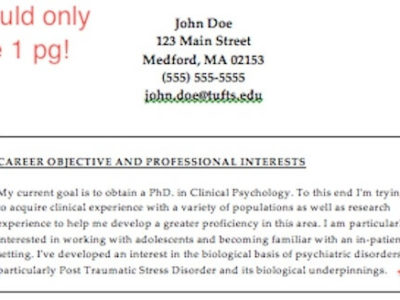You venture into the vast world of job searching and now you need to update that resume of yours. Luckily for business majors, your degree offers various different professional routes you can take. With this being said, maintaining an updated, properly constructed resume remains essential to receiving your dream job. These words of advice from professionals provide helpful insight for all business majors to take into consideration before applying to any job of their choice.
Read on to find out what they have to say so you land the job of your dreams.
Tailoring your resume

Many people make the mistake of providing a cookie-cutter resume that they use for every job they apply for. Providing employers with a basic, ordinary resume does not make you stand out from other applicants. Employers look for skills and characteristics that specifically correlate to the open position. Try customizing your resume with each application to fit the job’s standards.
“A great way to tailor your resume to a specific job description is to look at the keywords the employer or recruiter uses to describe either the job responsibilities or preferred qualifications. Any way you can include the same keywords, phrases or qualities on your resume that an employer is specifically mentioning in the job description will help better align your background and skill set to what they are seeking in a candidate,” Student Success Career Advisor of the Feliciano School of Business at Montclair State University Annie Lobb said.
Each job you apply for may look for similar requirements and skills yet word them differently. For example, one job might mention problem solving skills in their description, while another may include an understanding of conflict resolution skills in their qualifications. Although the two go hand-in-hand, you want to mention the specific skill the company looks for in their employees. Tweaking a few words here and there throughout your resume goes a long way to help you in receiving the job you want.
Little experience? No problem

Although employers sometimes prefer applicants with prior experience, that experience can only get the applicants so far. Employers would rather hire someone with little experience who will do outstanding work once properly trained than someone with experience who exhibits mediocre work at best. Just because someone obtained experience in a certain field does not necessarily mean they excel in it. At the end of the day, employers look for proficient candidates to fill a position the most, even if that takes a little time getting used to the job.
“For students who maybe do not have a lot of work experience or relevant experience to the industry they’re looking to get in to, I recommend that they focus more on their transferable skills that they can take to any job or industry. I also recommend that they put more of a focus on their education and academic information. Maybe they don’t have internship experience but have worked on a lot of projects related to the industry they’re applying into. They can include project information or a list of relevant coursework to give an employer a better sense of their academic background instead,” Lobb said.
Your resume does not need to show that you’re an expert on the position you apply for. It just needs to show that you are capable of easily getting to that point of expertise with the skills you already possess. Everyone starts somewhere and employers understand that. Don’t get intimidated by a job that you think you’re underqualified for just from reading the job description. If you obtain the degree and proper skills required to work in the field of business, then that means you’re qualified. The rest you learn in time once you start working.
Best Templates

Just as every resume should contain specific information tailored to the employer, formatting your resume also goes a long way in the application process. Resumes should display a format that’s organized and easily readable. Depending on the company, employers may go through hundreds of applications for each position. Resumes can get easily overlooked just from the format alone. If the employer does not find a resume worth their time, it does not matter how qualified one may seem for the job.
“The best template is the one you make yourself! Try to avoid templates that have you input information into a text box or area you can’t adjust. A lot of premade templates can really prohibit the amount of information you can include or will limit how customizable you can be with your resume. Keep information concise, use the same font and font size throughout your resume, and use industry-related keywords to help your information stand out,” Lobb said.
Although you want an organized resume, you also want it to stand out from the many others that employers go through. Try getting creative with your format to add individuality. Although looking up online templates may seem like a professional way to go about a resume, it limits what you want the employer to know about you. It lacks your own creative touch that employers look for in just about any job.
Stand Out

Employers go through multiple applications every day for each position they try to fill. Setting your resume apart from other applicants gives you an upper hand in receiving the job. You should take into consideration any small aspect regarding your resume to help set yourself apart. Even the slightest details go a long way in constructing a resume that makes an impact on recruiters.
“A well-crafted business major’s resume can stand out by effectively incorporating a combination of key elements that highlight their unique accomplishments, tailored with the job description and demonstrating the potential to be a valuable asset to the company. I recommend researching the company to learn more about its mission, products, services and clients to gain an understanding of why you believe you are a good fit for the organization and identify value-added contributions. Quantify your accomplishments to show impact and effectiveness by including bullet points on your resume. Recruiters like to see that you have demonstrated critical thinking abilities and business proficiencies on your resume, therefore, I recommend including specific challenges where you have implemented effective solutions, completed industry certifications or gained technical skills relevant to the business domain,” Director of Career Services for the Feliciano School of Business at Montclair State University Dr. Sabrina K. Sanichar said.
Your resume should reflect what skills you offer to the one specific job opening, not just business skills in general. When applying for a job, everyone wants to seem marketable. Merely stating your skills on a resume does not hold much substance. Instead, mention ways you used your acquired skills to accomplish a task or meet a goal. Employers take a risk each time they hire an applicant, so you want to exhibit a resume that shows you can actually apply the skills you possess to fulfill the job’s requirements.
Including a Resume Summary

A resume summary located at the very beginning of your resume serves as the very first thing recruiters see. Besides your name and contact information, that piece of information resembles a first impression to employers. Whether or not to include a resume summary comes at the discretion of the applicant. Depending on your experience level, you may or may not find it necessary to include.
“A resume summary is suggested when you have gained relevant years of professional work experience and skillsets aligned with the job opportunity while expressing how you can add value and contribute to the success of the company. If you decide to include a resume summary, you will want to write a compelling introduction that is approximately two to four sentences, in fragment form. Since the resume summary is the first section that a recruiter reviews, capturing the reviewer’s attention is key. Whether you decide to craft a resume summary or objective, consider focusing on showcasing your key strengths and what you can bring to the table as a potential intern or employee,” Sanichar said.
If you haven’t obtained much experience in the world of business just yet, perhaps you won’t need a resume summary. Including a resume summary when unnecessary could possibly harm your chance of getting the job. You run the risk of sounding repetitive by mentioning the same experience and skills in other portions of your resume, where employers can lose interest. On the other hand, resume summaries serve their purpose for more experienced applicants, as it gives them another space to highlight more skills and achievements attained over time.
Avoiding Overused Phrases

Employers get tired of reading the same qualities time and time again. Reading characteristics such as flexible, motivated or obtaining a strong work ethic hold little value and do not make you stand out to employers. Most of these traits pertain to just about any career, not specified to your desired position. Exhibiting unique traits and characteristics through your previous achievements or experiences will more likely intrigue employers.
“I recommend the ‘results first’ technique referred to as the XYZ formula, ‘Accomplished X, as measured by Y, by doing Z.’ An example is ‘Achieved a 100% completion rate of time-sensitive projects, as measured by client satisfaction surveys, by effectively prioritizing tasks and working extra hours to meet deadlines.’ Other effective resume writing techniques that you can use are the CAR or PAR acronyms which stand for Challenge, Action, Results (CAR) or Problem, Action, Results (PAR). In the era of Artificial Intelligence (AI), if you encounter challenges with creating resume bullet points, I recommend that you use an AI resume creation tool, if available, to accelerate the process supplemented by resume reviews from career services professionals at your university’s career center,” Sanichar said.
Many other applicants more than likely share similar qualities and characteristics as you. However, everyone attains certain skills differently. Highlighting your experiences of how you attained flexibility, motivation or acquiring a strong work ethic will go a lot farther than simply stating the same mundane phrases employers read all the time. Trying the tips that Sanichar provided above can help make the process of tweaking your resume a whole lot easier.
Make Previous Experiences Relevant

Whether you cultivated a hefty amount of experience in the business field or little to no experience at all, any amount of experience can help land the job you hope to receive. Don’t discount any skills, opportunities or roles solely because it does not specialize in the business world. More than likely, your skills and previous experiences can come in handy in your future career. Even if your skills or experiences do not pertain specifically to business, make them pertain to business.
“Skills that were learned from previous employment help in the real world, such as working in teams and organizational skills. No matter the job you previously had, there are always things you learn from them that can help you in the future. Every employment opportunity gives you new skills that you can carry over to the next one,” Monmouth University graduate and accountant at Unity Construction Michael Principe said.
Evaluate the different skills you acquired from each job, internship, volunteer work and extracurricular to see how they translate into your desired position. Taking notes from the job description while keeping in mind your prior experiences makes constructing your resume all the easier. Try keeping your information rather recent. Employers want to hear what you learned from your most recent job or extracurricular experiences, not so much your first high school job. Go down the list of all the jobs you’ve ever worked and filter through which ones you can use to your advantage in your resume.
Not Too Long, Not Too Short

Due to how many applications employers go through, lengthy resumes often get overlooked. With this being said, brief resumes do not show enough experience or effort to be considered for the job. You want to exhibit a well-balanced resume with all the information necessary to land the job and nothing else. It may seem tricky to know how much information to include and when to stop. It’s not so much about how many words you use in your resume, but rather which words you use.
“When trying to cut down your resume, do not harp on items that are not important for your desired opportunity and keep it strictly to items that will help you in the position you are going for. When trying to add more information to a resume, evaluate more skills you have acquired from previous experiences. Prior experiences are a huge plus. In the business world, working with people in a team setting and meeting new clients is a major part. I would say touch more upon your social skills because it is huge in the business field,” Principe said.
You want to provide well-versed characteristics and a variety of experiences on one page to keep the interest of your employer. Try avoiding long gaps in between jobs, internships, volunteer work, extracurriculars and other experiences. Once you finish the information, try reading it as if you were the employer and see what kind of impression it would make. This can help you see more clearly as to what areas need more work and what areas you can cut down to create a well-balanced resume.
Avoid Repetitiveness

Many jobs that we acquire over the years may require similar skills. We obtain characteristics from certain jobs that carry over into the next one. For example, your first high-school job may have taught you punctuality, communication skills with the public and how to develop a strong work ethic. All of these qualities remain essential to most jobs, including the one you consider applying for. Including these skills in every job, internship, volunteer work or extracurricular activity you mention in your resume will start to go stale and make employers less intrigued to continue reading.
“You want to stress your skills in the positioning statement and highlight key marketable skills in the core competency section. Use these as the hook and reel to your resume to make the employers want to keep reading. The education portion is a little tricky, so try mentioning specific skills you acquired from projects throughout different courses. Athletes can highlight qualitative and quantitative data regarding their improvement in the sport. This is transferrable within the role of business and finance because it provides a strategy to improve stats. Another area you can showcase skills is through clubs and organizations that represent leadership and communication skills. All these sections throughout the resume are required not only specific to your major, but also related to the role you’re going into,” Director of Career Planning and Development at Wagner College Rosa Santana said.
Different sections of your resume will naturally require you to highlight different skills. For example, your definition of a “hard worker” looks different in your economics class than it does on the basketball court. Instead of merely describing yourself as hardworking in each portion of your resume, touch upon what you experienced in your academics, athletics, previous jobs and extracurriculars that took hard work and commitment. This makes each portion of your resume specific and lets employers know the different ways you exploit your skills in different areas of your life.
Resume for Careers Changers

Let’s say you’re one of the many people who got the epiphany on what they wanted to do a little later on in life. Maybe you switched majors countless of times and ended up satisfied with business. Perhaps you thought you wanted to pursue the profession of a lawyer, made plans of going to law school, got involved in your university’s student government and received internships and previous jobs related to that field of study. You did all this only to find out that becoming a lawyer does not fulfill what you want to do in life. Plenty of people go through this same experience and come out just as successful as those who never switched their major once in their life.
“The good thing about shifting from one career to a career in business is that every career is business. What you put on your resume all depends on what roles you’re looking for. I started working in graphic design and I shifted to higher education. When I spoke about my time at the graphic design firm, I talked about how I taught educated strategies. Even though they are two different industries, I had to think about when I would do what an instructor also does. I trained employees at the graphic design firm, but in order to better suit my new career field, I said that I taught employees. Instead of saying I followed an agenda, I said that I followed a curriculum. The biggest thing is shifting your language to better direct it towards the role you plan on getting into,” Santana said.
Business’s versatile nature makes just about any job you acquired in the past helpful to the field. Using distinct wording in your resume that applies to your desired job will make previous experiences, even if not directly related to the field of business, a remaining impact on employers reading your resume. Make the focus of your resume not on your experience alone, but rather on the skills required for the job you apply for. See how you can incorporate the skills you obtained from prior experience to the job you aim to receive.



















